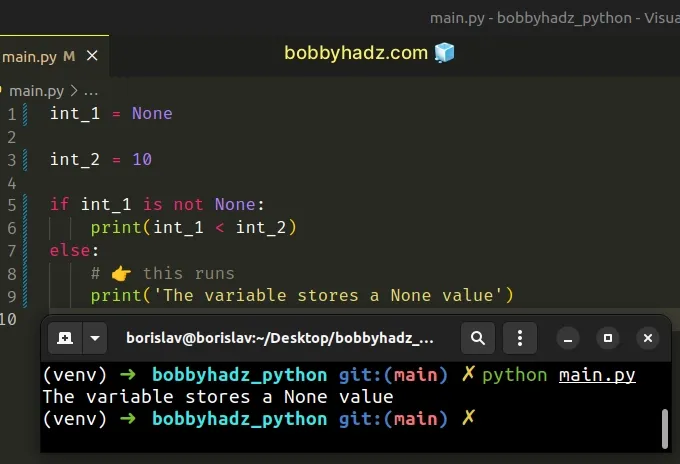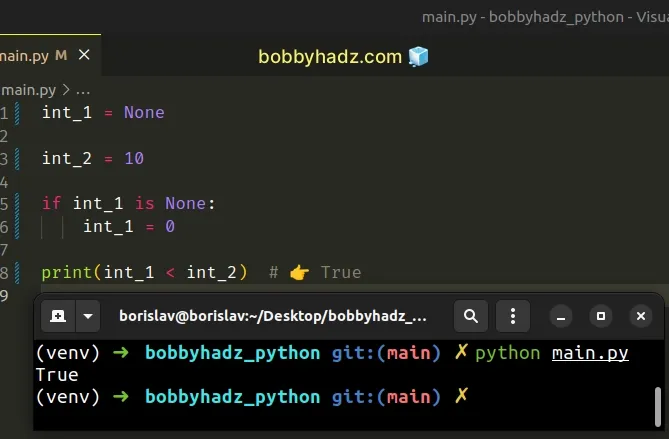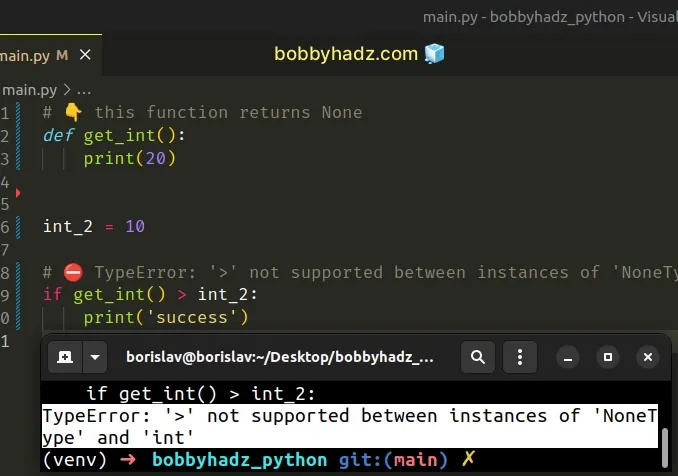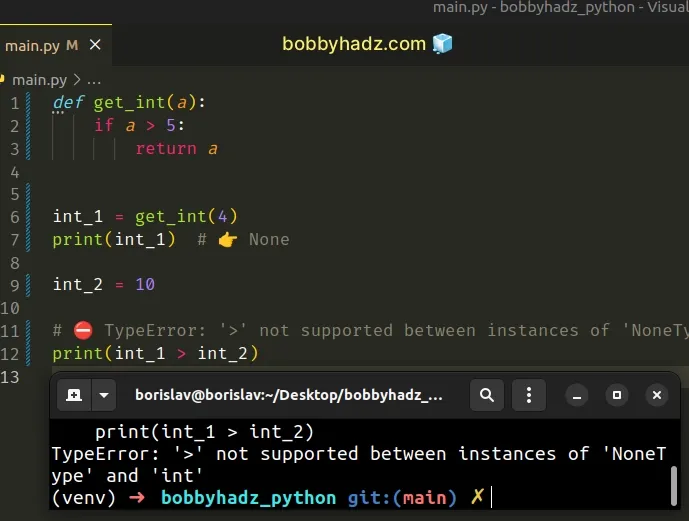< Not supported between instances of 'NoneType' and 'int'
Last updated: Apr 8, 2024
Reading time·6 min

# Table of Contents
- < not supported between instances of 'NoneType' and 'int'
- '>' not supported between instances of 'NoneType' and float
# < not supported between instances of 'NoneType' and 'int'
The Python "TypeError: '<' not supported between instances of 'NoneType' and
'int'" occurs when we use a comparison operator between a None value and an
int.
To solve the error, figure out where the None value comes from and correct
the assignment.

Here is an example of how the error occurs.
int_1 = None int_2 = 10 # ⛔️ TypeError: '<' not supported between instances of 'NoneType' and 'int' if int_1 < int_2: print('success')
We used a comparison operator between values of incompatible types (None and
int) which caused the error.
# Checking if a variable doesn't store None before the comparison
Use an if statement if you need to
check whether a variable doesn't store a None value
before using a comparison operator.
int_1 = None int_2 = 10 if int_1 is not None: print(int_1 < int_2) else: # 👉️ This runs print('The variable stores a None value')

The if statement checks if the variable doesn't store a None value.
The comparison operator is only used if the variable is not None, so the error
isn't raised.
Alternatively, you can set the variable to 0 if it stores None.
int_1 = None int_2 = 10 if int_1 is None: int_1 = 0 print(int_1 < int_2) # 👉️ True

If the int_1 variable stores a None value, we set it to 0 before using a
comparison operator.
# Track down where the None value comes from
To solve the error, you have to figure out where the None value comes from and
correct the assignment or conditionally check if the variable doesn't store
None.
The most common sources of None values are:
- Having a function that doesn't return anything (returns
Noneimplicitly). - Explicitly setting a variable to
None. - Assigning a variable to the result of calling a built-in function that doesn't return anything.
- Having a function that only returns a value if a certain condition is met.
# Make sure you haven't reassigned a variable to None
Make sure you haven't mistakenly reassigned the variable to None.
int_1 = 50 int_1 = None # ⛔️ TypeError: '>' not supported between instances of 'NoneType' and 'int' print(int_1 > 25)
We initially set the variable to an integer, but later reassigned it to None.
Trying to compare a None value to an integer causes the error.
# Functions that don't return anything return None
Functions that don't explicitly return a value return None.
# 👇️ This function returns None def get_int(): print(20) int_2 = 10 # ⛔️ TypeError: '>' not supported between instances of 'NoneType' and 'int' if get_int() > int_2: print('success')

You can use a return statement to return a value from a function.
def get_int(): return 20 int_2 = 10 if get_int() > int_2: # ✅ This runs print('success')
The function now returns an integer, so we can safely compare the two integer values.
# Many built-in methods return None
Many built-in methods mutate an object in place and
return None, e.g. sort(), append(), extend(),
etc.
Another common source of None values is trying to
assign the output of print() to a variable.
result = print(5 + 5) print(result) # 👉️ None
The print() function prints a message and returns None.
You can remove the call to print() and assign the result of the expression to
a variable.
result = 5 + 5 print(result) # 👉️ 10
# Having a function that returns a value only if a condition is met
Another common cause of the error is having a function that returns a value only if a condition is met.
def get_int(a): if a > 5: return a int_1 = get_int(4) print(int_1) # 👉️ None int_2 = 10 # ⛔️ TypeError: '>' not supported between instances of 'NoneType' and 'int' print(int_1 > int_2)

The if statement in the get_int function is only run if the supplied number
is greater than 5.
None.To solve the error, you either have to check if the function didn't return
None or return a default value if the condition isn't met.
def get_int(a): if a > 5: return a return 0 int_1 = get_int(4) print(int_1) # 👉️ 0 int_2 = 10 print(int_1 > int_2) # 👉️ False
Now the function is guaranteed to return a value regardless if the condition is met.
# '>' not supported between instances of 'NoneType' and float
The Python "TypeError: '>' not supported between instances of 'NoneType' and
'float'" occurs when we use a comparison operator between a None value and a
float.
To solve the error, track down where the None value comes from and correct
the assignment.

Here is an example of how the error occurs.
float_1 = None float_2 = 3.14 # ⛔️ TypeError: '>' not supported between instances of 'NoneType' and 'float' if float_1 > float_2: print('success')
We used a comparison operator between values of incompatible types (None and
float) which caused the error.
# Check if the variable is not None before comparing
Use an if statement if you need to check whether a variable doesn't store a
None value before using a comparison operator.
float_1 = None float_2 = 3.14 if float_1 is not None: print(float_1 < float_2) else: # 👉️ this runs print('variable stores a None value')
The variable in the example stores a None value, so the comparison is never
evaluated and the else block runs.
Alternatively, you can set the variable to 0 if it stores None.
float_1 = None float_2 = 3.14 if float_1 is None: float_1 = 0 print(float_1 < float_2) # 👉️ True
If the float_1 variable stores a None value, we set it to 0 before using a
comparison operator.
# Track down where the variable got assigned a None value
To solve the error, you have to figure out where the None value comes from and
correct the assignment or conditionally check if the variable doesn't store
None.
The most common sources of None values are:
- Having a function that doesn't return anything (returns
Noneimplicitly). - Explicitly setting a variable to
None. - Assigning a variable to the result of calling a built-in function that doesn't return anything.
- Having a function that only returns a value if a certain condition is met.
# Reassigning a float variable by mistake
Make sure you haven't set a variable that initially was set to a float to a
None value.
float_1 = 5.5 float_1 = None # ⛔️ TypeError: '>' not supported between instances of 'NoneType' and 'float' print(float_1 > 3.14)
We initialized the float_1 variable to a floating-point number but it later
got assigned a None value.
# Make sure to return from your functions
Functions that don't explicitly return a value return None.
# 👇️ This function returns None def get_float(): print(5.5) float_2 = 3.14 # ⛔️ TypeError: '>' not supported between instances of 'NoneType' and 'float' if get_float() > float_2: print('success')
You can use a return statement to return a value from a function.
def get_float(): return 5.5 float_2 = 3.14 if get_float() > float_2: # ✅ this runs print('success')
The function returns a floating-point number, so the comparison works as expected.
# A function returning a value only if a condition is met
Another common cause of the error is having a function that returns a value only if a condition is met.
def get_float(a): if a > 5: return a float_1 = get_float(4) print(float_1) # 👉️ None float_2 = 3.14 # ⛔️ TypeError: '<' not supported between instances of 'NoneType' and 'float' print(float_1 < float_2)
The if statement in the get_float function is only run if the passed-in
number is greater than 5.
None.To solve the error, you either have to check if the function didn't return
None, or return a default value if the condition is not met.
def get_float(a): if a > 5: return a return 0 # 👈️ return 0 if condition not met float_1 = get_float(4) print(float_1) # 👉️ 0 float_2 = 3.14 print(float_1 < float_2) # 👉️ True
Now the function is guaranteed to return a value regardless of whether the condition is met.

